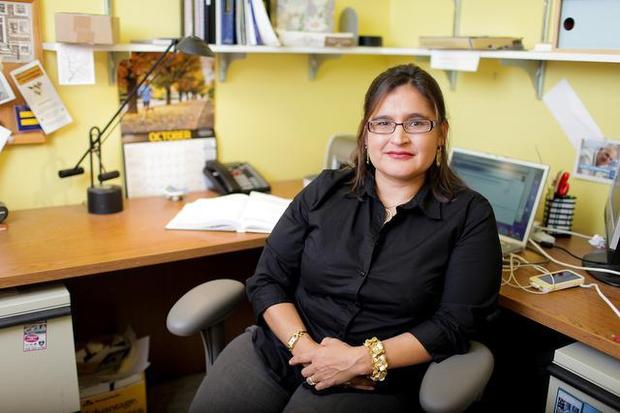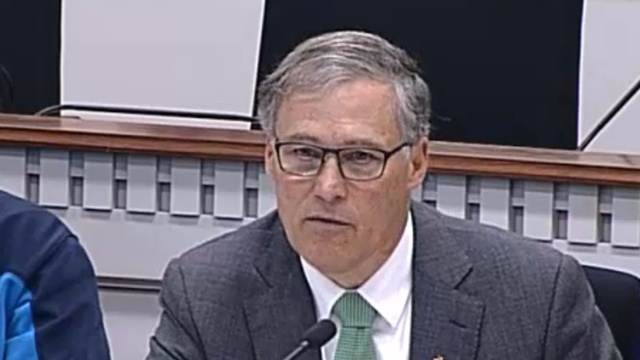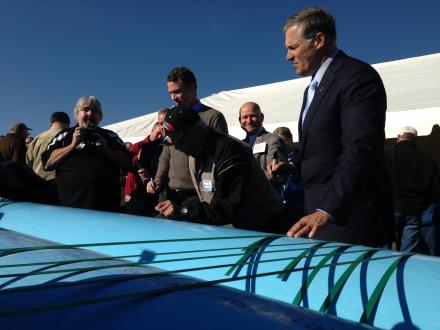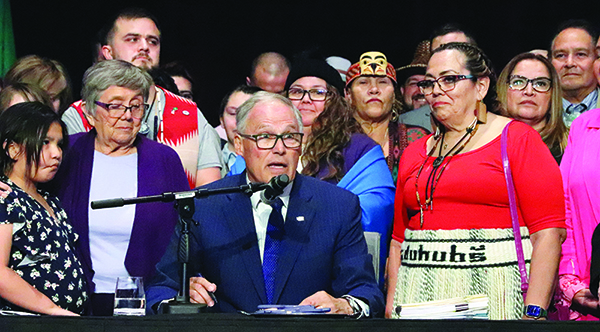
By Wade Sheldon, Tulalip News
A momentous day unfolded for the people of Tulalip and all Indigenous communities in Washington State as Governor Jay Inslee visited the Tulalip Resort Casino on March 19 to sign several new house bills. These bills not only enhance the recognition and education of the Native community but also allocate additional resources and aid to assist tribal communities grappling with the drug epidemic.
The occasion wouldn’t have been possible had it not been for one of Tulalip’s greatest champions of the people, the late John McCoy (lulilas). John loved his people and his country, and because of this, he served 20 years in the Air Force, became a computer programmer, and worked in U.S. President Ronald Reagan’s situation room in the white house. In 2002, he ran for Washington State Senate and won. There, he served ten years in the Washington House of Representatives after being appointed to the State Senate, representing the 38th Legislative District.
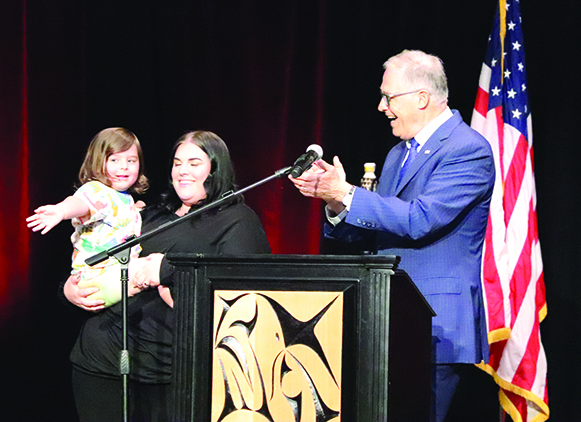
One highlighted bill was No. 1879, Since Time Immemorial Curriculum, a testament to John’s dedication. This meticulously developed curriculum aims to teach about the Indigenous tribes of Washington State accurately. It marks the first instance of the Legislature incorporating Lushootseed language into State law. The bill explicitly acknowledges John McCoy’s tireless and visionary efforts in supporting student and educator learning about the history, culture, and government of federally recognized Indian tribes in the Pacific Northwest.
In 2005, John sponsored Substitute House Bill No. 1495 to compile comprehensive information on tribal history, culture, and government statewide. This initiative sought to integrate these vital aspects into the social studies curriculum, particularly in courses covering the history of Washington and the United States. Due to McCoy’s diligent efforts, the Legislature will pay tribute to him by naming the curriculum the John McCoy (lulilas) Since Time Immemorial Curriculum.

“In Washington D.C, he broke down barriers, built bridges, and educated tribals and non-tribals alike about the challenges faced in Indian Country,” said Tulalip Tribes Chairwoman Teri Gobin. “He had national recognition for being an innovative and visionary leader and bringing the Legislature forward not only for the tribe but also for the state of Washington and all of Indian Country. Our children are benefiting from what he has fought to bring to this State.”
“John sponsored the foundational Legislation that led to the teaching of the curriculum on tribal history, government, and culture in our schools,” Governor Jay Inslee said. “This is also the first time the Legislature will incorporate the Lushootseed language into law in the history of the State of Washington.”
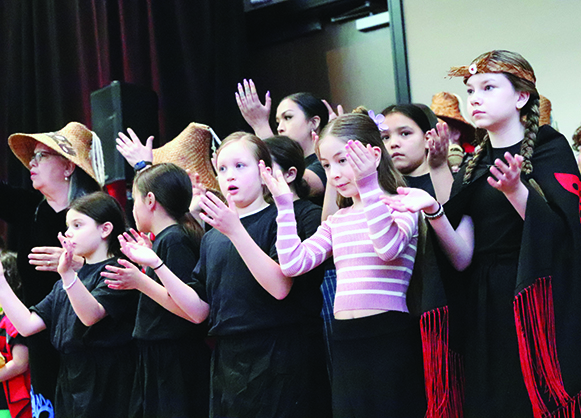
“My dad fought for everyone, not just the people in Washington State but for all Indian Country,” John McCoy’s daughter Sheila Hillarie said. “He worked that bill to help his grandchildren. There were mostly plains Indians, and that was talked about in school when I was growing up. There was nothing about the coastal Natives. So, I feel that this Bill John McCoy (lulilas) Since Time Immemorial Curriculum will help educate the people on the culture and knowledge of tribes.”
The legacy of John McCoy is a beacon of advocacy and progress for the Tulalip community and all Indigenous peoples across Washington State. His tireless dedication to education, culture, and tribal sovereignty has left an indelible mark on Legislation and learning. As we move forward, let us continue to honor his memory by embracing the rich heritage and wisdom of our native communities, ensuring a brighter future for generations to come.
________________________________________
- House Bill No. 1879 – Relating to naming the curriculum used to inform students about tribal history, culture, and government after John McCoy (Lulilas). Primary Sponsor: Rep. Lekanoff
- Third Substitute House Bill No. 1228 – Relating to building a multilingual, multiliterate Washington through dual and tribal language education. Primary Sponsor: Rep. Ortiz-Self
- Engrossed Substitute House Bill No. 2019 – Relating to establishing a Native American apprentice assistance program. Primary Sponsor: Rep Steams
- Substitute House Bill No. 2075 – Relating to licensing of Indian health care providers as establishments Primary Sponsor: Rep. Lekanoff
- Substitute House Bill No. 2335 – Relating to state-tribal education compacts. Primary Sponsor: Rep. Santos
- Substitute Senate Bill No. 6146 – Relating to tribal warrants. Primary Sponsor: Rep. Dhingra
- Substitute Senate Bill No. 6186 – Relating to Disclosure of recipient information to the Washington state patrol for purposes of locating missing and murdered indigenous women and other missing and murdered indigenous persons. Primary Sponsor: Rep. Kauffman
- Second Substitute House Bill No. 1877 – Relating to improving the Washington state behavioral health system for better coordination and recognition with the Indian behavioral health system. Primary Sponsor: Rep. Lekanoff
- Substitute Senate Bill No. 6099 – Relating to creating tribal opioid prevention and treatment account. Primary Sponsor: Sen Dhingra

